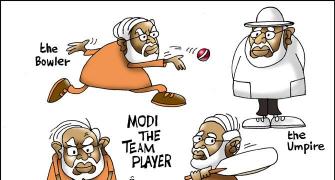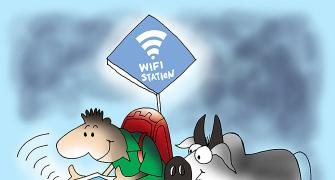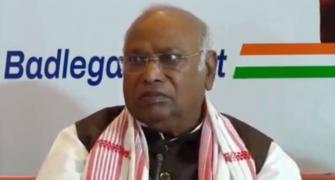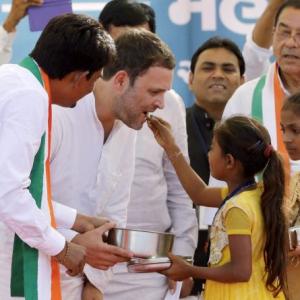The Congress’s new economy-centric focus is evident from the election discourse Gandhi is following in Gujarat, reports Aditi Phadnis.

Joblessness and unequal economic growth rather than mandir-masjid or caste will be at the core of Rahul Gandhi’s attack on the Narendra Modi-led National Democratic Alliance government, going forward. Or: It’s the economy, stupid.
This is the strong message foreign institutional investors (FIIs) get whenever they meet Gandhi.
The last such meeting was held on November 15.
“We are getting, on average, one request for a meeting a week. The interest in what Gandhi has to say on the economy has increased exponentially after his US visit,” said a party manager.
Big FIIs like the Capital group (Assets under management of $1.4 trillion in December 2016), Wellington ($620 billion) and GIC (the Singapore government’s sovereign fund) have met Gandhi several times.
“He (Gandhi) has successfully managed to shift the larger narrative from social issues to economic issues. Today, jobs and economic growth are mainstream issues, thanks to Rahul Gandhi,” says economist Praveen Chakravarty, who has been part of several such meeting with Gandhi.
At the FII interaction on Wednesday, Gandhi was asked many questions about the Modi government’s decision of recapitalisation of banks, and what he and his party would have done in such circumstances. Gandhi was reportedly clear: There wasn’t enough information about the nature of the bonds that would recapitalise banks; and in any case, bank recapitalisation should be paid for via tax revenues, not the way this government had done by using money put in banks by depositors, post-demonetisation.
Gandhi has also let FIIs know that if the Congress comes to power, it will tweak the goods and services tax (GST) design to address the worries of small traders. It would raise the turnover-threshold of traders who are required to submit paperwork (invoices, etc) for the GST.
This comes among concerns in the investor community about whether as an Opposition the Congress could attempt to derail and even overturn the spirit of a reform the success of which hinges upon the cooperation of state governments.
The Congress’s new economy-centric focus is evident from the election discourse Gandhi is following in Gujarat: That the Modi government’s performance on job creation is abysmal; there is little made in India; and that while China creates 50,000 jobs every day, India creates 500.
Apart from FIIs, Gandhi is also meeting economists, microfinance companies and data-collection firms. The Centre for Monitoring Indian Economy (CMIE) flew down 50 of its researchers for a meeting with Gandhi last month after they got a call from his office.
"We got a call that Mr Gandhi wanted to understand the jobs, unemployment and well being of households in the country better,” said Mahesh Vyas of CMIE.
The institute had produced data and a report on unemployment, demonetisation and the GST on the basis of surveys across 160,000 households across India. Gandhi wanted to meet surveyors to get a first hand account of what they saw and felt.
One of Gandhi’s questions to the surveyors was: “If educated people find it difficult to get jobs, then do their households deny education to other children of the household?”
Vyas said this question led to an interesting debate and anecdotes about household behaviour, which concluded that behaviour was a function of the income of the household.
The impact of the GST was discussed at length, especially the problems of small businesses, which were laying off people.
At one point, Gandhi asked whether households faced desperation or even starvation if there was so much pain. He was quickly informed that households borrow and survive in the face of loss of jobs and wages; they don’t starve. The surveyors told him that when households were asked how they would repay, the response was that they had left it to God.
CMIE’s data and analysis has been questioned by several ministers. But the meeting with Gandhi lasted two and a half hours.
When Gandhi met microfinance companies, especially from Andhra Pradesh, he listened quietly as they launched into a tirade against the Congress government, led by Y S Rajashekhar Reddy, which launched a campaign against them.
He also met CEOs of start-ups such as Snapdeal and Ola.
This new side of the Congress vice president is likely to be in evidence in Parliament as well.










